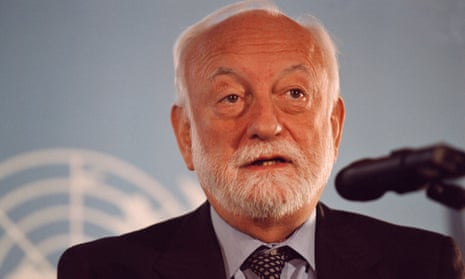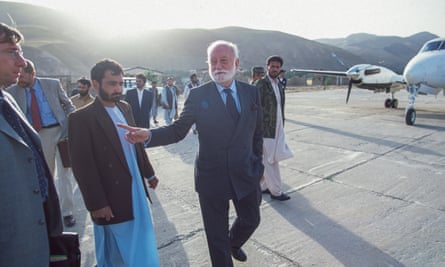
Francesc Vendrell, who has died aged 82, was one of the longest serving and most successful United Nations peace negotiators of modern times. He helped to promote the disbanding of the CIA-backed “contras” in 1989 who were terrorising parts of Nicaragua in a campaign to overthrow the Sandinista government. He held secret meetings with the Cuban president, Fidel Castro, while brokering a deal between the rightwing US-supported government of El Salvador and the nationalist guerrilla movement, the Farabundo Martí National Liberation Front, which led to a ceasefire and free elections in 1992.
He played a major role in ending Indonesia’s bloody occupation of East Timor and organising a referendum for independence in 1999. For the next two years, as the UN secretary general’s envoy to Afghanistan, Vendrell launched the first contacts between the Taliban government and the Northern Alliance of regional warlords.
At a time when the UN was often pilloried by politicians and much of the media as irrelevant or a costly minor actor, Vendrell’s successes in Central America, East Timor and Afghanistan deserved more recognition.
He did not like the word “mediator” to describe his speciality as a diplomat. It sounded too interventionist. In a series of post-retirement interviews for the journal Asian Affairs, Vendrell told David Loyn, a veteran BBC correspondent, that he preferred to tell warring parties that his job was to provide “good offices” or simply say: “We’re here to help.” He made clear that he did not represent the UN security council or the general assembly, but the secretary general.
This low-key, even soft-seeming approach was enhanced by Vendrell’s ferocious energy in insisting on meeting all parties in a conflict and listening carefully and empathetically to their views. He had a formidable memory for detail. But he could also be outspoken in his suggestions for parties to modify or change their stands.
In the Central America peace negotiations the man who led the process was Alvaro de Soto, a Peruvian diplomat who was the UN secretary general’s personal representative. Vendrell was his deputy. In De Soto’s words, “Francesc was not always at the negotiations themselves. But he was an invaluable adviser who was extremely useful when there was a serious roadblock since he knew all the players. He was a shaper of the talks and very good at detecting differences between leaders. He knew how to conduct an x-ray of the different groups”.

Vendrell was born into an upper-middle class family in Barcelona. His father, Francesc, was a lawyer who became the city’s deputy mayor in the pre-Franco period. His mother, Matilda (nee Vendrell), was his father’s cousin. Francesc Jr gained a law degree from Barcelona university. After joining a political party, the Unio Democratic de Catalunya, and campaigning with its leader across Europe denouncing Franco’s dictatorship. Vendrell moved to Britain. He studied law at King’s College London and for an MA in modern history from Cambridge.
He took a teaching post at the University of Papua New Guinea and joined the UN in 1968. His first job was on the Melanesian island of Bougainville but he soon transferred to Unitar (the UN Institute for Training and Research) in Geneva. He worked there for several years and was thrilled when he managed to switch to the UN’s political wing, first in the department of decolonisation in Geneva and then at the UN’s headquarters in New York.
His big career chance came in 1986 when he was appointed director for Europe and the Americas in the secretary general’s research and information office.
This led to his role in ending the civil wars in Central America. He and his boss, De Soto, were proud to have got the UN directly involved. As Vendrell put it, De Soto and he brought an end to the Monroe Doctrine, under which the US had for almost two centuries forbidden outside powers from intervening in its backyard in Latin America.
In 1992, Vendrell was appointed director for special political assignments in the new department of political affairs. He led a mission to Armenia and Azerbaijan to discuss the Nagorno-Karabakh conflict (1992) and another to Haiti (1993). Between 1993 and 1999, he was director for Asia and the Pacific, with a special eye on Cambodia, Papua New Guinea and Myanmar. The job catered perfectly to his addiction to travel and the acquisition of polymathic knowledge about dozens of regional political groups and movements.
His job of overseeing Asia led Vendrell to his career’s high point, the assignment which gave him greatest gratification: the liberation of East Timor (Timor-Leste) from Indonesian occupation. After the collapse of fascism in Portugal in 1974 the original colonisers, the Portuguese, had unilaterally left the territory in 1975, only for it to be occupied by Indonesian forces with the connivance of the US. For almost two decades, the Indonesians arrested or shot members of the local liberation movement with impunity. Journalists were barred from entry. Western governments did nothing.
After reports of massacres began to filter out in 1997 the Indonesians slightly loosened their grip. They allowed UN officials to come in and Vendrell was even permitted to visit the independence movement leader Xanana Gusmão in jail. But the Indonesians rejected the movement’s demand for a UN-supervised referendum.
Undeterred, Vendrell turned to his favourite tactic of talking patiently and at length to all sides. He persuaded the Indonesians to let him set up an “all-inclusive intra-East Timorese dialogue”. It consisted of 30 Timorese people, 15 from the diaspora and 15 from inside, chosen by the secretary general, ie by Vendrell. Some supported East Timor remaining under Indonesian control.
The Indonesian regime agreed to consider autonomy and Vendrell drafted a paper suggesting how it should be done.
Coincidentally, demonstrations had begun in Jakarta against the Indonesian regime, run by General Suharto. In 1998 he resigned in the face of massive protests. Surprisingly, his successor agreed to hold a referendum on autonomy or independence, thinking the autonomy option would win. But Timorese voted by a huge majority for independence. The army reacted furiously and went on a killing rampage until the UN security council authorised a UN peace-keeping force, to be led by Australia. In 2002 the territory became independent.
By then Vendrell had moved on to a country that he came to love: Afghanistan. In January 2000 he was appointed the UN secretary general’s special representative to Afghanistan. He succeeded in opening contacts with the Taliban and the warlords, the so-called “mujahideen” who had fought the Soviet occupation in the 1980s, but this progress was blown away when al-Qaida attacked the US in September 2001. The US invaded and removed the Taliban.
The UN was asked to organise a conference in Bonn for the various Afghan groups to agree on a new government. Lakhdar Brahimi, a former Algerian foreign minister, was appointed as UN envoy over Vendrell’s head. Vendrell helped to prepare the conference but was unhappy with the Bush administration’s imposition of Hamid Karzai as president instead of letting the Afghans decide.
He also disagreed with the American policy, supported by Brahimi, of a “light footprint” for foreign peacekeepers. Vendrell had spoken to numerous civil society representatives who wanted the northern warlords to be disarmed and removed from power, and this required a strong peacekeeping force.
“I wanted the security council to pass a resolution saying that conquest of territory did not give the right to govern. The aim was to prevent the Northern Alliance taking over,” he told me some years later.
Frustrated by US policy, Vendrell resigned in 2002. But he felt committed to Afghanistan and soon took a job as the European Union’s representative in Kabul. He was to live there for the next six years, acting as a polite but firm critic of the Karzai administration.
After retirement he continued to travel to Kabul frequently as chairman of the advisory board of the Afghanistan Analysts Network, a group of independent experts. He also regularly taught classes on the art of negotiation and conflict resolution at Princeton and Johns Hopkins University.
In 1971 he met Gordon Wilkins, a New York business executive, who became his lifelong partner. When not travelling, which they both loved, they divided their time between flats in New York City and London. Vendrell was a committed anglophile, who prized Britain’s traditions and rule of law, and was proud to be made a Companion of the Order of St Michael and St George in 2012.
Gordon survives him.
 Afghanistan Peace Campaign
Afghanistan Peace Campaign